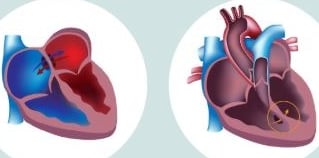Karnataka’s Silent Health Crisis: Over 41,000 Children Battling Congenital Heart Disease, Government Data Reveals
Karnataka, a state often praised for its advancements in healthcare and medical research, is now grappling with a hidden health crisis that demands urgent attention. According to recent government data, more than 41,000 children across Karnataka are living with congenital heart disease (CHD)—a condition present from birth that directly affects the normal functioning of the heart.


By: Bharat Daily Samachar Date: 22 Sep,2025
What is Congenital Heart Disease?
Congenital heart disease refers to structural defects in the heart that are present at birth. These defects can range from minor holes in the heart that may heal on their own, to more severe complications that require surgery or lifelong medication. In many cases, children with CHD face difficulties such as breathing problems, poor weight gain, fatigue, and frequent infections.
Medical experts note that with proper treatment—ranging from corrective surgeries to advanced interventions—many children with congenital heart disease can lead healthy, fulfilling lives. However, the cost of treatment and lack of timely detection often push families into medical and financial distress.
The Numbers That Raise Alarm
Government data confirming over 41,000 children affected in Karnataka has triggered concern among health activists, doctors, and child welfare groups. While urban centers like Bengaluru, Mysuru, and Hubballi-Dharwad have specialized hospitals and cardiology units, children in rural and semi-urban areas remain the most vulnerable, as they struggle to access quality healthcare facilities.
The state’s healthcare system, despite being advanced in comparison to several other regions, still falls short in early screening programs. Many cases of congenital heart disease go undiagnosed until the child develops severe symptoms. This delay not only complicates treatment but also increases the risk of fatalities.
Why Karnataka’s Case is Concerning
Karnataka has some of the best medical institutions in India, including world-class cardiac care facilities. Yet, the existence of such a high number of children living with congenital heart disease points to deeper systemic issues:
Late Detection: Many newborns are not screened for congenital heart conditions immediately after birth, especially in government hospitals in rural areas.
Cost of Treatment: Pediatric heart surgeries are often expensive, leaving families struggling financially.
Limited Pediatric Cardiology Centers: Specialized care is mostly concentrated in Bengaluru and a few other cities, leaving many districts underserved.
Awareness Gap: Lack of awareness among parents and even local health workers delays timely medical intervention.
Impact on Families
For parents, discovering that their child has a congenital heart condition is both emotionally and financially devastating. Many families in Karnataka—particularly in rural areas—are unable to afford costly surgeries that may run into lakhs of rupees.
Even after successful surgeries, children often require lifelong monitoring, medicines, and follow-up procedures. Families not only face the burden of medical expenses but also the psychological toll of caring for a child with a chronic condition.
Government Efforts and the Road Ahead
The Karnataka government has launched several initiatives to address congenital heart disease in children, including financial assistance programs under the National Health Mission (NHM) and tie-ups with specialized hospitals for subsidized treatment. Schemes like the Rashtriya Bal Swasthya Karyakram (RBSK) also aim to provide free health screenings for children, which can help in early detection of congenital heart conditions.
However, experts argue that the efforts need to go further. Suggestions include:
Compulsory neonatal screening: Making it mandatory in all government and private hospitals to detect heart defects in newborns at an early stage.
More pediatric cardiac centers: Setting up specialized units in tier-2 and tier-3 cities to reduce travel and costs for families.
Awareness campaigns: Educating parents, especially in rural areas, about symptoms such as bluish skin, constant fatigue, or difficulty in feeding.
Insurance support: Expanding health insurance coverage for congenital heart surgeries to reduce the financial burden.
A Call for Collective Action
Healthcare professionals emphasize that congenital heart disease should not be viewed as a rare or isolated issue. With over 41,000 children already affected in Karnataka, this is a public health challenge that requires collaboration between government, private hospitals, NGOs, and local communities.
Early detection, affordable treatment, and sustained post-surgery care can transform the lives of thousands of children who currently face uncertain futures. Moreover, by investing in stronger pediatric health infrastructure, Karnataka could set an example for other states in India dealing with similar challenges.
Conclusion
The revelation that 41,000 children in Karnataka are suffering from congenital heart disease is both a wake-up call and an opportunity. It highlights the urgent need for stronger healthcare systems, better screening programs, and increased public awareness.
If addressed with seriousness and compassion, Karnataka can not only reduce child mortality rates but also ensure that children born with congenital heart conditions get the chance to live healthy, dignified, and hopeful lives.
